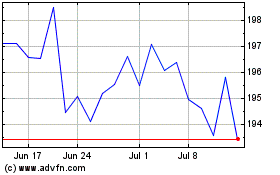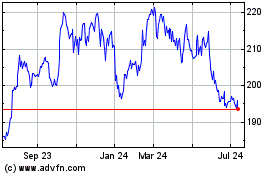2nd UPDATE: CME Group Calls On CFTC To 'Terminate' EFF Inquiry
February 17 2010 - 1:23PM
Dow Jones News
CME Group Inc. (CME) called on U.S. regulators to drop a probe
into its decision to bar clients from shifting contract positions
to and from a rival futures exchange.
The Chicago exchange operator said the Commodity Futures
Exchange Commission had overlooked precedents in assessing the spat
between CME and ELX Futures LP.
CME and ELX have jousted for months over the issue, and a final
decision from the CFTC is keenly awaited by the industry as it
could open the way for so-called "fungibility," a move that could
transform competition in the sector.
CFTC officials last month rejected CME's justification for
blocking the migration of trades with ELX, which launched last year
in a bid to break its rival's near-monopoly in the Treasury futures
market.
CME General Counsel Kathleen Cronin reiterated in a letter to
the CFTC that its reasons for prohibiting the transactions are
backed up by the Commodity Exchange Act.
Noting that a rule at one exchange is not necessarily binding at
another, Cronin said that there is "no legitimate reason" for CME
to allow transactions that do not have economic substance and that
could make its markets more volatile.
ELX Chief Executive Neal Wolkoff said in a statement Wednesday
that CME's response amounted to an attack on CFTC staff, and
offered no new justification on CME's part.
The disagreement began in October 2009 when regulators approved
ELX's Exchange of Futures for Futures, or EFF, rule intended to
allow investors to shift Treasury futures positions among
markets.
CME later told members that such "transitory" trades are barred
by the Commodity Exchange Act--but the CFTC last month asked CME to
further justify its rejection of such trades, noting the CEA
provides for similar transactions on other exchanges.
In CME's latest response, Cronin cited an antitrust provision,
writing that ELX's argument essentially obligates CME to allow the
transfer of customer positions from CME's markets to ELX "to foster
the growth of ELX's business."
"Contrary to ELX's contention, it is well-established antitrust
law that a refusal to assist a competitor is not an unreasonable
restraint of trade," Cronin said.
She added that CFTC staff overlooked their own precedent
regarding so-called wash trades--transactions that carry no market
risk--and pointed to a January CFTC enforcement action against
similar practices in the natural gas futures market.
"ELX's goal is to move a long and short position between two
clearinghouses without the assumption of any market risk," Cronin
wrote. "There is no real transaction between the parties except an
agreement to move open interest. This illustrates the very
definition of a fictitious, wash trade under Commission
precedent."
Allowing ELX's brand of EFF trades, according to Cronin, would
hamper competition and undermine the CME's role in price
discovery.
Wolkoff said the CME is wrong to equate EFF transactions to wash
trades, and that he hopes "the CME will respect the earlier
comments made by the CFTC and stop undermining the futures
regulatory body."
-By Jacob Bunge, Dow Jones Newswires; 312-750-4117;
jacob.bunge@dowjones.com
CME (NASDAQ:CME)
Historical Stock Chart
From Jun 2024 to Jul 2024

CME (NASDAQ:CME)
Historical Stock Chart
From Jul 2023 to Jul 2024
